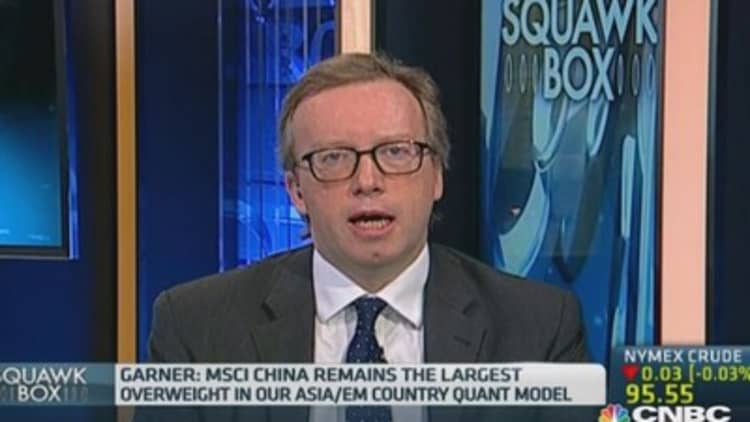Most Asian equities traded higher on the final trading day of the week, following an upbeat handover from the U.S. as conciliatory comments from Russia eased geopolitical concerns.
U.S. markets closed at August highs on Thursday, overlooking subpar economic data from Europe. The euro zone posted a flat gross domestic product (GDP) reading, missing expectations, while a contraction in Germany's economy signaled underlying stress.
Both the Dow Jones Industrial Average and the S&P 500 advanced 0.4 percent. The Nasdaq also closed 0.4 percent higher with NetApp leading gains on better-than-expected results.
The CBOE Volatility Index (VIX), widely considered the best gauge of fear in the market, fell to just below 13 as geopolitical jitters subsided.
Read MoreBeware the pitfalls of strong stocks: El-Erian
Geopolitical events
In a speech in Crimea, which Russia annexed from Ukraine in March, Russian President Vladimir Putin struck a conciliatory tone: "We will do everything in our power so that this conflict is ended as soon as possible, so that the blood can stop flowing in Ukraine."
In Iraq, Nouri al-Maliki has given up his fight to remain Prime Minister of Iraq and pledged support for his successor, Haider al-Abadi, state television reported on Thursday.
Over in the Middle East, a new truce remains in effect after Israel and Palestinian factions agreed to extend the ceasefire for five more days on Wednesday.
Mainland shares up
China's Shanghai Composite Index rebounded after two sessions in the red to end 1 percent higher on Friday.
Poly Real Estate bolstered 1.8 percent each while China Merchants Property and Gemdale piled on 0.7 percent each.
Financials also recouped loss grounds on Friday, in particular the Agricultural Bank of China which climbed 0.8 percent after it obtained regulatory approval to issue up to $29 billion worth of preference shares to help shore up their capital, according to Reuters.
Meanwhile, Hong Kong stocks rose 0.6 percent on the back of a 6 percent surge in China Mobile shares. The key Hang Seng index briefly hit 25,010, levels not seen since July 1 2008.

Tokyo flat
Japan's key Nikkei index pared earlier losses to close a tick higher on Friday, moving off slightly from Thursday's one-week closing high.
A weak yen and anticipation that the Japanese public pension funds and other public accounts will step up buying, fueled positive sentiment for the week. But the currency, trading near 102.5 against the U.S. dollar, failed to lift trade on Friday.
Carmakers were mostly in the red; Toyota Motor and Suzuki Motor lost 0.3 and 0.2 percent each. Japan Aviation Electronics was one of the biggest losers, falling 0.8 percent.
Outperforming the bourse was Sony which charged into a three-day winning streak with a 2 percent gain.
Read MoreDo markets need to rejig rate expectations?
Sydney up 0.3%
Australia's benchmark S&P ASX 200 ended the week with its biggest weekly gain since mid-February.
Australia and New Zealand Bank was down 1 percent all day, despite an 8 percent rise in net profits for the first 9 months of its fiscal year, on strong loan growth and its Asian operations.
Gains in the miners capped losses; BHP Billiton and Fortescue Metals scaled 2.3 and 1.3 percent, respectively.
In other earnings news, shares of the world's biggest fiber cement products maker James Hardie plunged over 7 percent, on news that its first quarter results skidded 80 percent due to unfavorable changes in exchange rates.
Read MoreChina graft crackdown drives money into Australia
Kuala Lumpur flat
Malaysian shares traded slightly above the flatline, despite news that the Southeast Asian country grew 6.4 percent in the April-June quarter, beating estimates. However, the hit a session high of 3.1650 against the greenback on the second quarter gross domestic product (GDP) data.
Meanwhile, China's foreign direct investment data for July is due later in the session. Traders will also keep an eye for Hong Kong's second quarter GDP figures.
Markets in South Korea and India are closed for holidays.

